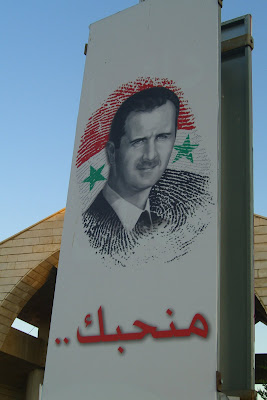 Taxis, tour buses, and private cars are lined up and not moving. Nevertheless, the border between Lebanon and Syria is full of hustle and bustle. Money changers, beggars, and to quote Cher, "tramps and thieves," are all around. Cars and SUVs coated in Arabian sand trickle through the crossing after coming from Bahrain, Saudi Arabia, Kuwait and other oil producing Gulf states.
Taxis, tour buses, and private cars are lined up and not moving. Nevertheless, the border between Lebanon and Syria is full of hustle and bustle. Money changers, beggars, and to quote Cher, "tramps and thieves," are all around. Cars and SUVs coated in Arabian sand trickle through the crossing after coming from Bahrain, Saudi Arabia, Kuwait and other oil producing Gulf states.After getting the passport stamped (along with twenty five other Westerners in my group) we waited for about two hours until the bus would be allowed through. As the bus passed under the border post there was nothing but concrete, past the border post were the dun colored hills of Syria.

The Syrian side of the border is quite an ironic place. First, there must be about one thousand pictures of Bashar Asad dotting the road, but then there is a duty free shop, complete with a Dunkin Donuts. What a great mix of consumerism, globalization, and the police state.
The duty free shop in itself was a study on the haves and have nots in Syria and Lebanon. The duty free was loaded with everything from Swiss chocolate, Cuban cigars, lego toys, and lots of liquor. Rich Lebanese business people and/or their sons would go to the place to buy $700 cellphones and $450 digital cameras. Syrians who went to the duty free were mostly army officers. The corruption in Syria is such, that those in the army, especially higher ranking officials are the only ones with cash to spend.

Also in the duty free, I got my first experience with the Syrian secret police, or, Mukhabarat. No matter where you went in the duty free, which was apparently owned by a Lebanese, there would always be a Syrian dressed in military fatigues or in dress pants following you. I went to take a shot of insulin in the bathroom and magically the "janitor" shows up to mop, only, he didn't mop, he just stood there near my bathroom door. When I exited he put the mop away and disappeared.
On the road to Damascus there were a few villages, and tons of Bashar Asad photographs. Everything in Syria was "cleaner" than in Lebanon. Garbage didn't usually line the streets, in Damascus there were many people out and about, traffic lights and traffic laws were obeyed. One of my fellow students asked me, "why are they obeying traffic lights like this?!" We were used to Lebanon where there are no traffic lights and one can drive while drinking a beer. My answer was, "what do you expect people to do if they knew their government wiped out a city and killed 20,000 people."
My answer really seemed to be the mood in Syria. The government was quite powerful. From the gaze of Bashar Asad's posters to the piles of Mukhabarat (I heard one Lebanese I was with say they were 1 in 5 of the Syrian population), Syria was firmly in the control of the al Asad clan.
My video of the Lebanese/Syrian border.
© All Rights Reserved; www.ArzelJabal.blogspot.com
No comments:
Post a Comment